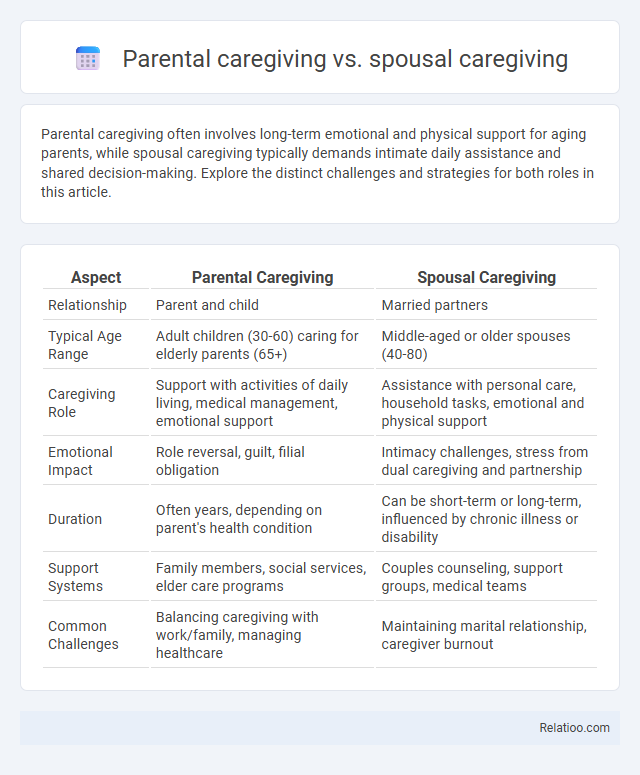Parental caregiving often involves long-term emotional and physical support for aging parents, while spousal caregiving typically demands intimate daily assistance and shared decision-making. Explore the distinct challenges and strategies for both roles in this article.
Table of Comparison
| Aspect | Parental Caregiving | Spousal Caregiving |
|---|---|---|
| Relationship | Parent and child | Married partners |
| Typical Age Range | Adult children (30-60) caring for elderly parents (65+) | Middle-aged or older spouses (40-80) |
| Caregiving Role | Support with activities of daily living, medical management, emotional support | Assistance with personal care, household tasks, emotional and physical support |
| Emotional Impact | Role reversal, guilt, filial obligation | Intimacy challenges, stress from dual caregiving and partnership |
| Duration | Often years, depending on parent's health condition | Can be short-term or long-term, influenced by chronic illness or disability |
| Support Systems | Family members, social services, elder care programs | Couples counseling, support groups, medical teams |
| Common Challenges | Balancing caregiving with work/family, managing healthcare | Maintaining marital relationship, caregiver burnout |
Introduction: Defining Parental and Spousal Caregiving
Parental caregiving involves providing physical, emotional, and financial support to aging or disabled parents, often balancing multiple family responsibilities. Spousal caregiving requires managing the comprehensive health needs of a partner while maintaining the intimacy and partnership dynamics of marriage. Understanding the distinct challenges and roles in your caregiving journey helps tailor effective support strategies for both parental and spousal caregiving contexts.
Demographic Trends in Caregiver Roles
Parental caregiving primarily involves middle-aged adults, often between 40 and 60 years, supporting elderly parents as life expectancy increases globally. Spousal caregiving tends to involve older adults, typically over 65, addressing age-related chronic conditions or disabilities within marital partnerships. Caregiving roles are increasingly diverse, with demographic shifts showing a rise in multi-generational caregiving households and a growing representation of female caregivers across all age groups.
Emotional Dynamics: Parent vs. Spouse Caregiving
Parental caregiving often involves nurturing and protective emotions rooted in lifelong bonds, whereas spousal caregiving encompasses intimate partnership dynamics that include shared life experiences and mutual dependency. You may experience more anticipatory grief and role reversal stress when caring for a parent, while spousal caregiving can trigger complex emotions related to loss of equality and changing relationship roles. Understanding these emotional dynamics helps tailor support strategies to improve caregiver well-being.
Physical and Mental Health Impacts on Caregivers
Parental caregiving often involves managing the complex needs of children with chronic illnesses or disabilities, leading to increased physical strain and elevated levels of stress compared to other caregiving roles. Spousal caregiving typically demands emotional resilience and physical endurance due to the intimate nature of the relationship and the progression of age-related illnesses, which can result in caregiver fatigue and mental health challenges such as anxiety and depression. Your mental health may suffer regardless of the caregiving context, but tailoring support strategies to the specific demands of parental or spousal caregiving can improve overall well-being and reduce adverse physical and psychological impacts.
Financial Challenges in Parental vs. Spousal Caregiving
Parental caregiving often entails long-term financial strain due to extended durations and costs associated with chronic conditions, impacting retirement savings more significantly than spousal caregiving. Spousal caregiving typically involves managing shared finances, but unexpected medical expenses and reduced income due to caregiving duties can cause substantial budget disruptions. Understanding these challenges helps you prepare for potential financial burdens unique to each caregiving role, emphasizing the need for tailored financial planning and support.
Navigating Family Relationships and Responsibilities
Balancing parental caregiving, spousal caregiving, and overall caregiving demands requires understanding unique emotional and practical challenges associated with each role. Your ability to navigate family relationships hinges on clear communication, setting boundaries, and recognizing the varied needs of aging parents versus a spouse. Effective caregiving strategies involve coordinating responsibilities, fostering empathy, and managing stress to support both caregivers and their loved ones.
Coping Strategies and Support Systems
Parental caregiving often requires managing long-term developmental needs and emotional support, with coping strategies that include seeking parent-focused support groups and respite care services. Spousal caregiving typically involves addressing chronic illnesses or end-of-life care, where reliance on couple-centered therapy and peer networks enhances coping mechanisms. General caregiving demands adaptive stress management techniques, utilizing diverse support systems such as community resources, professional counseling, and technology-based assistance for effective resilience building.
Legal and Ethical Considerations in Caregiving
Parental caregiving, spousal caregiving, and general caregiving each involve distinct legal and ethical challenges, particularly regarding decision-making authority, consent, and guardianship rights. You must understand that parental caregivers often have legal responsibility over minors, while spousal caregivers may require power of attorney or advance directives to make healthcare decisions. Ethical considerations revolve around balancing autonomy, privacy, and best interests, with caregivers needing to navigate complex family dynamics and legal frameworks to protect the care recipient's rights and dignity.
Long-Term Outcomes for Caregivers and Care Recipients
Parental caregiving often involves higher emotional burden and extended durations compared to spousal caregiving, leading to increased risk of caregiver burnout and mental health challenges. Spousal caregivers typically face more intensive daily care demands, which can accelerate physical decline and stress-related illnesses, impacting both caregiver and care recipient long-term well-being. Long-term outcomes for caregivers and care recipients vary significantly by relationship type, with tailored support interventions essential to improve quality of life and reduce adverse health effects across caregiving contexts.
Resources and Recommendations for Caregivers
Parental caregiving, spousal caregiving, and general caregiving require tailored resources to address unique emotional and physical challenges; parental caregivers often benefit from child-focused support services, while spousal caregivers need relationship-centered counseling and respite care options. Access to specialized training programs, financial aid, and community support networks enhances caregiver resilience and effectiveness. Recommended interventions include caregiver education, stress management workshops, and connection to healthcare professionals for comprehensive guidance and resource optimization.

Infographic: Parental caregiving vs spousal caregiving
 relatioo.com
relatioo.com